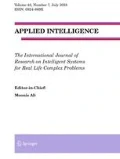Abstract
In qualitative decision-theoretic planning, desires—qualitative abstractions of utility functions—are combined with defaults—qualitative abstractions of probability distributions—to calculate the expected utilities of actions. This paper is inspired from Lang's framework of qualitative decision theory, in which utility functions are constructed from desires. Unfortunately, there is no consensus about the desirable logical properties of desires, in contrast to the case for defaults. To do justice to the wide variety of desires we define parameterized desires in an extension of Lang's framework. We introduce three parameters, which help us to implement different facets of risk. The strength parameter encodes the importance of the desire, the lifting parameter encodes how to determine the utility of a set (proposition) from the utilities of its elements (worlds), and the polarity parameter encodes the relation between gain of utility for rewards and loss of utility for violations. The parameters influence how desires interact, and they thus increase the control on the construction process of utility functions from desires.
Similar content being viewed by others
References
R.D. Luce and H. Raiffa, Games and Decisions, John Wiley: New York, 1957.
R. Jeffrey, The Logic of Decision, University of Chicago Press, 2nd ed. 1983.
R.L. Keeney and H. Raiffa, Decisions with Multiple Objectives: Preferences and Value Trade-offs, Wiley and Sons. New York, 1976.
J. Doyle and M.P. Wellman, “Preferential semantics for goals,” in Proceedings of AAAI-91, Anaheim, 1991, pp. 698-703.
P. Haddawy and S. Hanks, “Representations for decision-theoretic planning: Utility functions for dead-line goals,” in Proceedings of the KR'92, Cambridge, MA, 1992.
C. Boutilier, “Toward a logic for qualitative decision theory,” in Proceedings of the KR'94, 1994, pp. 75-86.
J. Lang, “Conditional desires and utilities-an alternative approach to qualitative decision theory,” in Proceedings of the ECAI'96, 1996, pp. 318-322.
J.D. Mullen, “Does the logic of preference rest on a mistake,” Metaphilosophy, vol. 10, pp. 247-255, 1979.
J. Pearl, “From conditional ought to qualitative decision theory,” in Proceedings of the UAI'93, 1993, pp. 12-20.
F. Bacchus and A.J. Grove, “Utility independence in a qualitative decision theory,” in Proceedings of KR'96, 1996, pp. 542-552.
S.-W. Tan and J. Pearl, “Specification and evaluation of preferences under uncertainty,” in Proceedings of the KR'94, 1994, pp. 530-539.
G. Pinkas, “Reasoning, nonmonotonicity and learning in connectionist networks that capture propositional knowledge,” Artificial Intelligence, vol. 77, pp. 203-247, 1995.
Y. Shoham, Reasoning About Change: Time and Causation from the Stand Point of Artificial Intelligence, MIT Press, Cambridge, Massachusetts, 1988.
S. Kraus, D. Lehmann, and M. Magidor, “Nonmonotonic reasoning, preferential models and cumulative logics,” Artificial Intelligence, vol. 44, pp. 167-207, 1990.
E.Weydert, “Default entailment a preferential construction semanaics for defeasible inference,” in Annual German Conference on Artificial Intelligence (KI-19): Bielefeld, Germany, September 11-13, 1995; proceedings, edited by I. Wachsmuth, C.-R. Rollinger, and W. Brauer, Springer: Berlin, vol. LNAI 981, pp. 173-184, 1995.
E. Weydert, “System J-revision entailment: Default reasoning through ranking measure updates,” in Practical Reasoning-International Conference on Formal and Applied Practical Reasoning, FAPR'96, vol. 1085 of Lecture Notes in Computer Science, edited by D. Gabbay and H.J. Ohlbach, Springer: Bonn, Germany, pp. 637-649, June 1996.
E. Weydert, “System JZ: How to build a canonical ranking model of a default knowledge base,” in Proceedings of the Seventh International Conference on Knowledge Representation and Reasoning (KR'98), 1998, pp. 190-201.
E. Weydert, “General belief measures,” in Tenth Conference on Uncertainty in Artificial Intelligence, Morgan Kaufmann: San Mateo, CA, 1994, pp. 575-582.
W. Spohn, “A general non-probabilistic theory of inductive reasoning,” in Uncertainty in Artificial Intelligence 4 (UAI'90), North Holland: Amsterdam, 1990.
D. Dubois and H. Prade, Possibility theory. Plenum Press: New York, 1988.
R. Thomason and R. Horty, “Nondeterministic action and dominance: Foundations for planning and qualitative decision,” in Proceedings of the TARK'96, Morgan Kaufmann, 1996, pp. 229-250.
D. Lewis, Counterfactuals, Blackwell: Oxford, 1973.
L. van der Torre and Y. Tan, “Contrary-to-duty reasoning with preference-based dyadic obligations,” Annals of Mathematics and Artificial Intelligence, vol. 27, pp. 49-78, 2000.
H. Prakken and M.J. Sergot, “Contrary-to-duty obligations,” Studia Logica, vol. 57, pp. 91-115, 1996.
J. Doyle, Y. Shoham, and M.P. Wellman, “The logic of relative desires” in Sixth International Symposium on Methodologies for Intelligent Systems, Charlotte, North Carolina, 1991.
S.-W. Tan and J. Pearl, “Qualitative decision theory,” in Proceedings of the AAAI'94, 1994.
M.P. Wellman and J. Doyle, “Modular utility representation for decision-theoretic planning,” in Proceedings of the First International Conference on Artificial Intelligence Planning Systems (AIPS92), 1992, pp. 236-242.
L. van der Torre and Y. Tan, “Deliberate robbery, or the calculating samaritan,” in Proceedings of the ECAI'98 Workshop on Practical Reasoning and Rationality (PRR'98), 1998.
R.I. Brafman and N. Friedman, “On decision-theoretic foundations for defaults,” in Proceedings of the Fourteenth International Joint Conference on Artificial Intelligence, edited by C.S. Mellish, Morgan Kaufmann, pp. 1458-1465, 1995.
B. Bonet and H. Geffner, “Arguing for decisions: A qualitative model of decision making,” in Proceedings of the 12th Conference on Uncertainty in Artificial Intelligence (UAI-96), edited by E. Horvitz and F. Jensen, Morgan Kaufmann Publishers, pp. 98-105, 1996.
M. Goldszmidt and J. Pearl, “Qualitative probabilities for default reasoning, belief revision, and causal modeling,” Artificial Intelligence, vol. 84, pp. 57-112, 1996.
Author information
Authors and Affiliations
Rights and permissions
About this article
Cite this article
Torre, L.V.D., Weydert, E. Parameters for Utilitarian Desires in a Qualitative Decision Theory. Applied Intelligence 14, 285–301 (2001). https://doi.org/10.1023/A:1011246803923
Issue Date:
DOI: https://doi.org/10.1023/A:1011246803923



